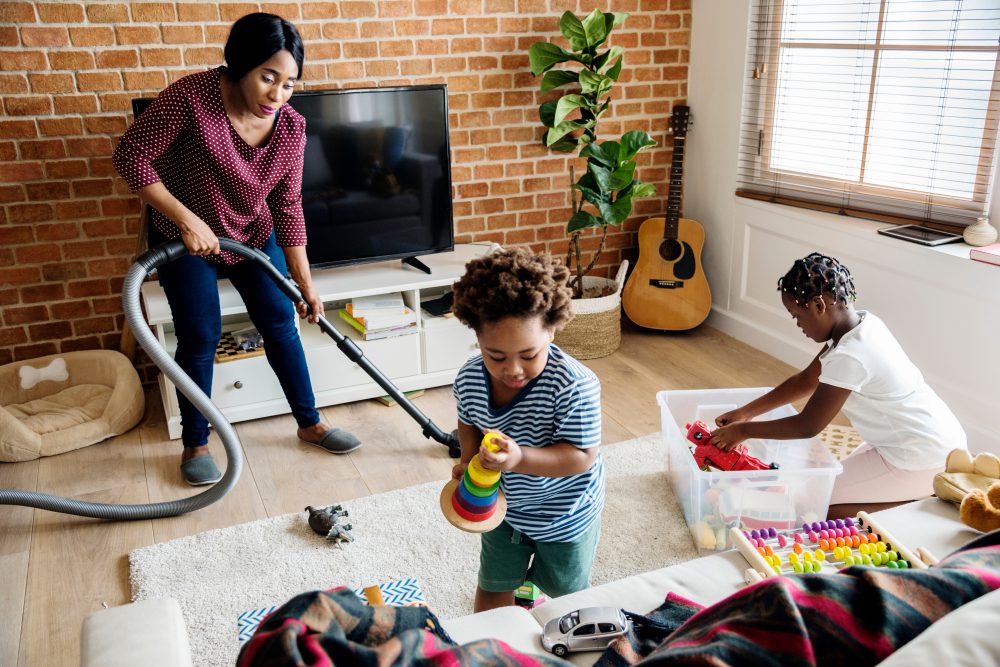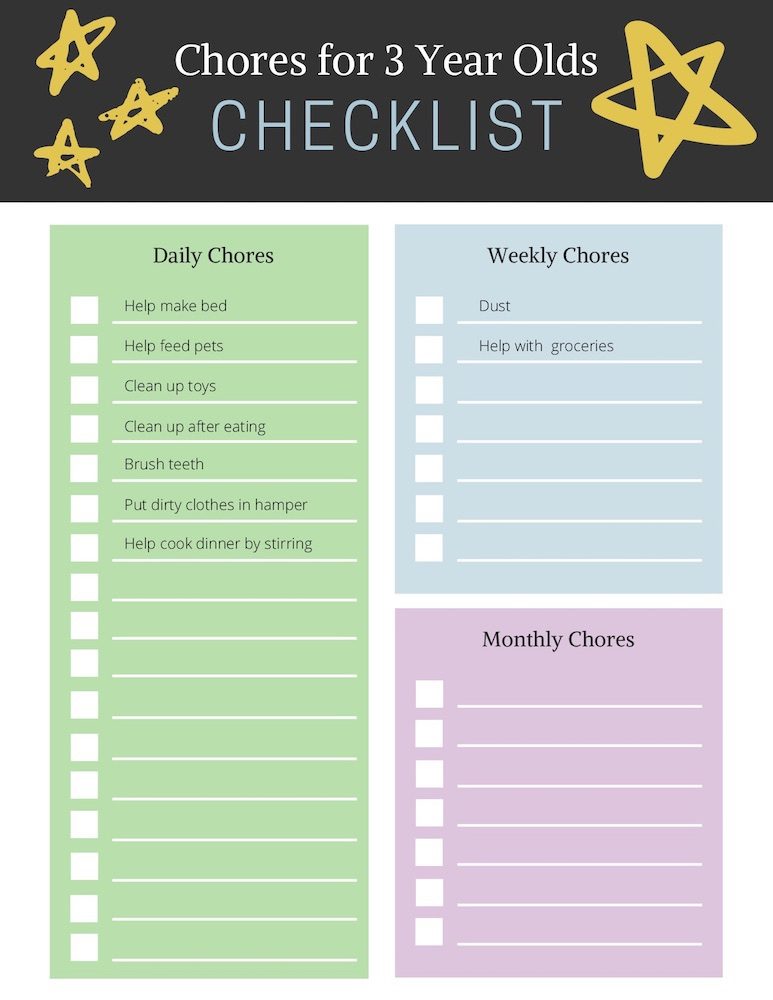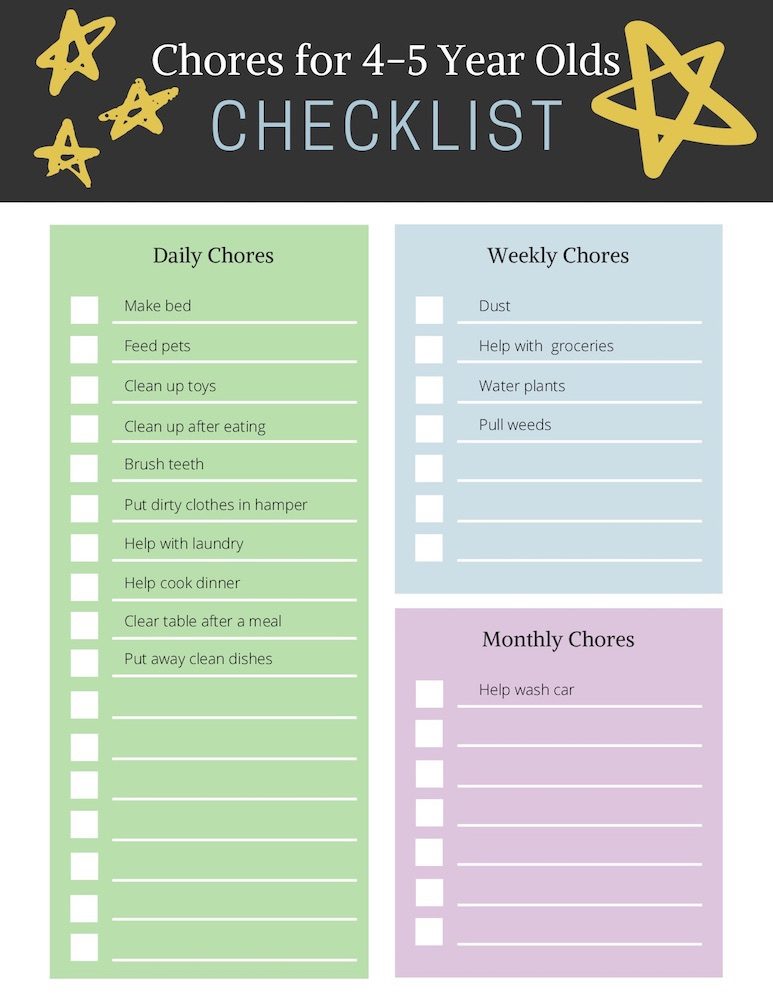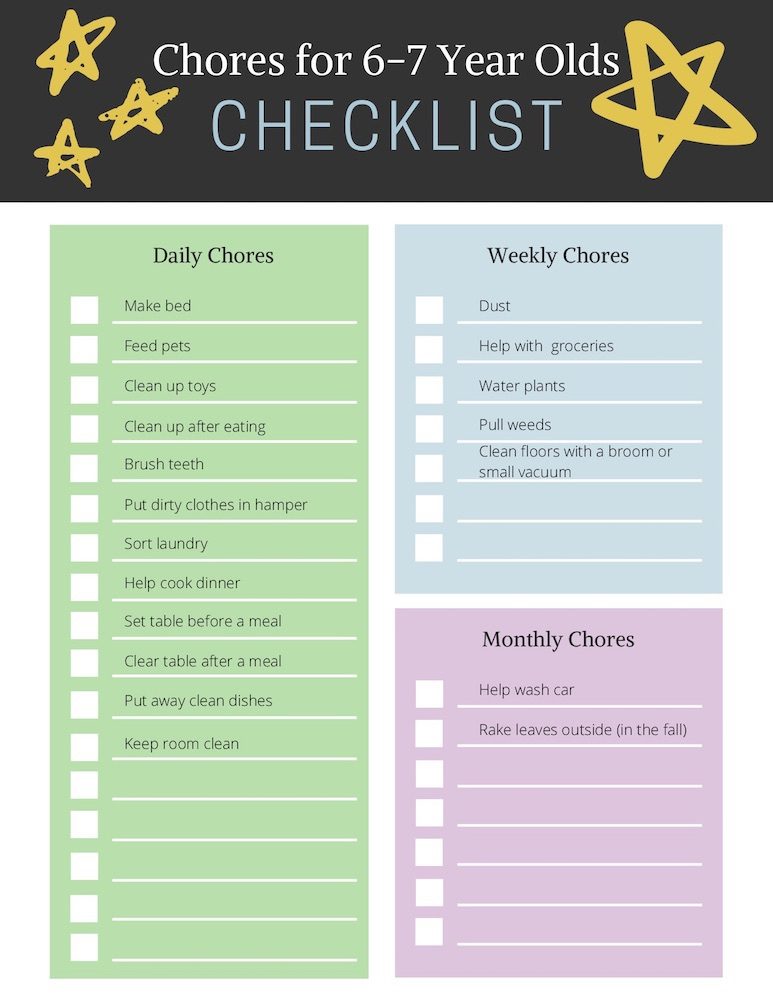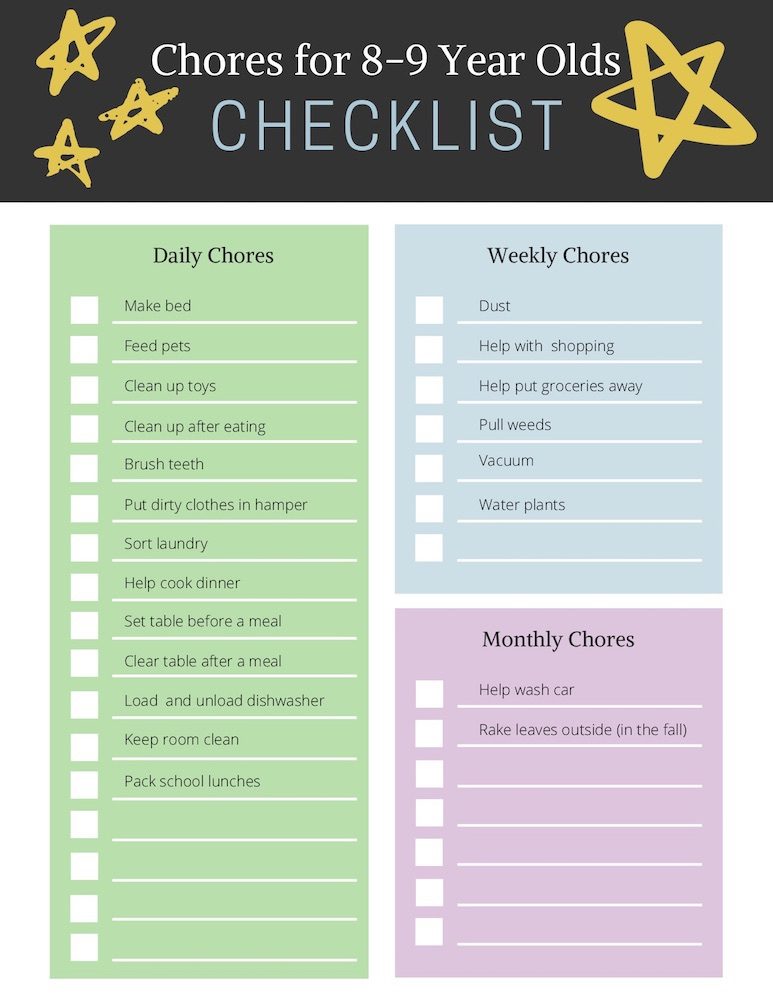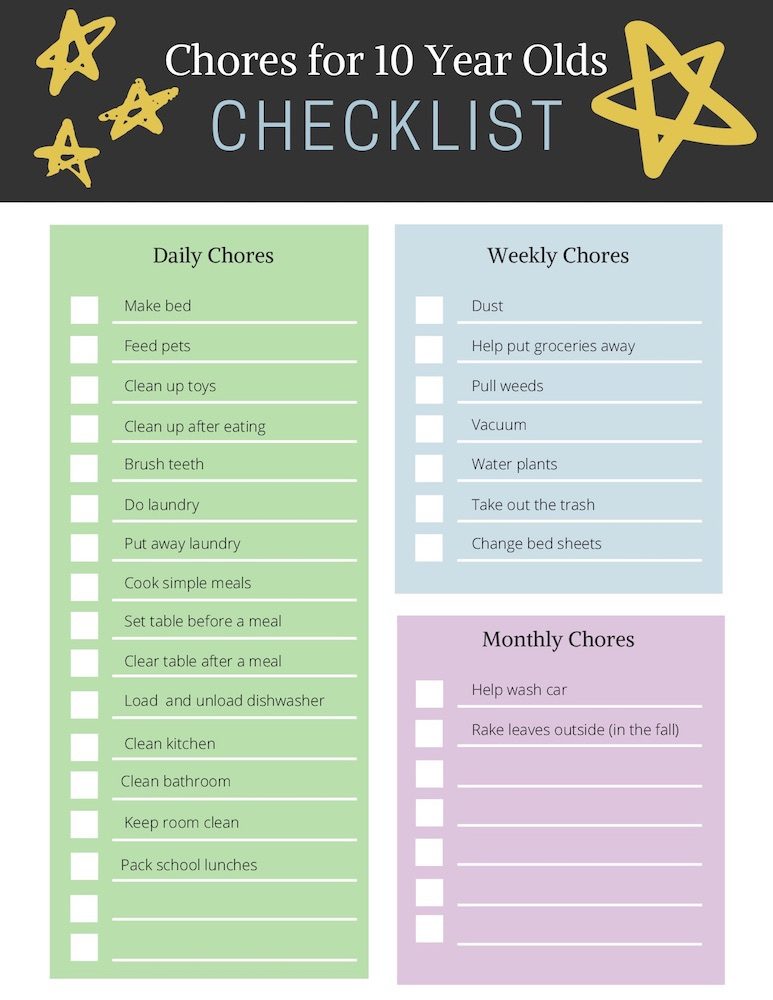Do you think kids should have chores?
Believe it or not, chores are incredibly beneficial for children. However, there is a lot to consider before assigning chores to your children.
For example, you might wonder what kind of chores to give them, how to divide the tasks fairly, and how to motivate your children to get the chores done.
Luckily for you, we have the answers!
Table of Contents
- Should kids have chores?
- How to divide household chores fairly
- How to get kids to do chores
- Should kids get paid to do chores?
- Making chores fun
- Consequences when kids don’t do chores
- Complete list of chores by age
Before we get into the comprehensive list of age-appropriate chores, let’s answer some critical questions about kids and chores!
What You Should Know About Age Appropriate Chores!
Should Kids Have Chores?
Some parents wonder whether their children should have chores. However, even young children who have age-appropriate chores can learn valuable lessons. How so?
Firstly, chores teach children important skills they will use throughout their lives. For example, if children help cook dinner every night, they will learn lifelong cooking skills. Even doing simple things like stirring can set a good foundation for more learning in the future.
Secondly, chores teach children responsibility. When children are held accountable for completing specific tasks, they learn leadership skills and become self-reliant. Responsibility is an important skill to learn as children grow older.
Thirdly, when children do chores, they are often doing tasks that help their parents. Over time, this will help them be more aware of other peoples’ needs, rather than their own. This will also help your child develop their maturity level.
Believe it or not, but doing household chores when children are as young as three and four plays a role in a child’s future success. Marty Rossman, an associate professor of family education, researched this subject. He found that a person’s success in their 20s could be determined by whether or not they did household chores when they were three and four.
So should kids have chores? Yes! They are hugely beneficial for children!
However, it’s important not to stress children out with too many chores. There should be a healthy balance of playtime and things like homework and chores. Otherwise, kids can get stressed out.
How to Divide Household Chores Fairly
So, now you know all about the benefits of assigning age-appropriate chores, it’s time to start assigning them. If you have more than one child, it’s in your best interest to divide the tasks fairly amongst the kids. Unequal workloads may cause tension and stress and strain relationships.
How do you divide chores fairly? Here are some tips!
- Switch It Up. One way is to have your kids take turns. For example, perhaps on Monday nights, one child washes the dishes while the other puts them away. Then, they switch jobs on Tuesday. Taking turns is a good way for every child to have a turn at all the chores.
- Divide by Age-Appropriateness. Say you have a four-year-old and a ten-year-old. Of course, the four-year-old cannot do all the chores the ten-year-old can. Therefore, it may be best to divide the duties between the two. For example, your four year old probably isn’t strong enough to work the vacuum on his/her own. Therefore, you could assign the chore of vacuuming to your ten-year-old, and your four-year-old can water the plants. This way, the tasks are divided fairly between each child without the workload being unequal.
- Use Visual Aides. An easy way to stay organized with chores is to make a chore chart for each child. Later in this article, you will find age-appropriate chore charts for each child. However, if you have more than one child, consider having a larger chart that lists chores for each of your children. This way, the chores can be divided equally among your kids. You could even use a calendar to record each days’ chores for each child.
How to Get Kids to Do Chores
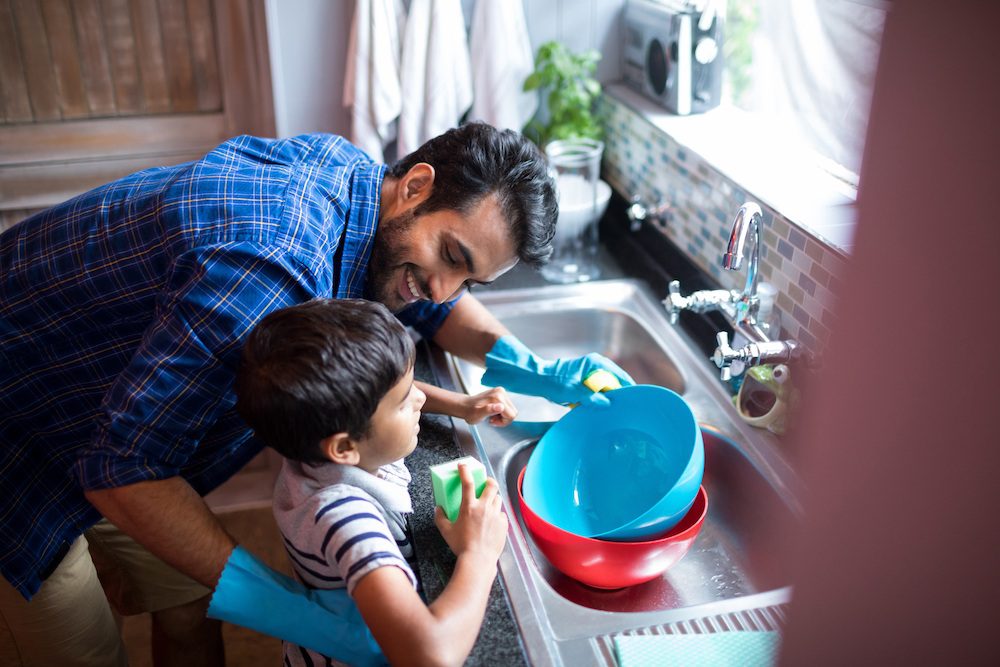
We’ve all heard the excuses—“I’ll do it later! I don’t want to! Can’t my sister do it?”
When given the appropriate circumstances, children are very savvy when it comes to excuses.
You’ve probably heard of these excuses before. So you’re probably wondering how to get kids to do chores. Here are some helpful tips!
- Take away the distractions. Turn off the electronics and put away the toys. You can promise your child they can enjoy those things after their chores. It may be helpful to ask your child what might be a distraction for him/her. Also, ask your children what they plan to do when they are done with their chores. Then, you can encourage them to finish their chores so they can have fun after.
- Set a time limit for chores. For example, you might say, “Please pick up your toys in the next fifteen minutes.” This can motivate your children to get their chores done when you tell them to. Of course, if your child cannot tell time yet, you will likely want to use other ways to motivate him/her.
- Reward good behavior. If your child can tell time, consider rewarding them for getting chores done on time. For example, you may say something like, “If you can pick up your toys in the next fifteen minutes, you can stay up for fifteen extra minutes before bedtime.”
- Set a good example. For example, if you are leaving your things lying around, your child will probably do the same. If you want your child to clean up their toys, for example, make sure you’re not leaving your things lying around too. Otherwise, your child will be less likely to listen to what you tell them to do.
Additionally, remember that children are eager to help. If you have a positive attitude and set a good example, then your child will be more likely to help out around the house without too much of a struggle. Be sure to show your child exactly how to do the chore first, easing them into the routine of doing them.
Should Kids Get Paid to Do Chores?
As discussed, the primary purpose of age-appropriate chores is to teach responsibility and life skills. While children need to learn how to handle money, they shouldn’t be paid to do tasks they are supposed to do anyway. Otherwise, children will start doing chores for money rather than to learn important lessons.
This is especially true for young children. If your child is old enough to know how to be responsible, money may be a nice incentive to encourage them to do extra chores around the house. However, it’s a good rule of thumb not to pay children to do chores they should be doing anyway.
So should kids get paid to do chores? Money can motivate older children to do extra chores around the house but is not a good incentive for everyday chores.
Chores for Kids to Earn Money
So what kind of chores should you pay children to do?
Chores for kids to earn money will vary based on the family and its values. As stated, you may want to assign these types of chores for older children who understand the value of money responsibility. Here are some good examples of extra chores kids ten and older can do for money:
- Mow the lawn
- Shovel snow
- Rake leaves
- Babysit younger siblings
- Help siblings with their laundry
- Wash the car
- Do extra cleaning around the house
How to Make Chores Fun
 So if you are not paying your child to do chores, is there a way to make doing chores fun? Yes! Why not try a point system for chores?
So if you are not paying your child to do chores, is there a way to make doing chores fun? Yes! Why not try a point system for chores?
Start by making a list of chores for your children and assigning a point value for each task. Small chores like making the bed may be worth one or two points, while a chore like vacuuming may be worth five points. As a suggestion, have a minimum number of points your child must collect each day or week. This way, your child can learn to budget his/her time.
Moreover, you could allow your child to exchange the points for rewards. For example, ten points could be worth a piece of candy or a sticker. Your child can choose to save up his/her points for larger rewards. Maybe 100 points is a trip to the ice cream shop, while 1,000 can be a trip to an amusement park. A point system for chores can be fun!
Another suggestion is to make a game of doing chores. For example, you could play basketball by throwing dirty clothes into the laundry hamper or by putting toys into a toy bin. Another way is to sing kids’ songs about cleaning up. In the end, if you have a positive attitude about a chore, your child is more likely to have a positive attitude about it too!
Consequences for Not Doing Chores
Generally, it’s not good to use chores as a punishment. In other words, if your child does something wrong, don’t force more duties on him/her. Instead, teaching children through positive reinforcement is a much better motivator to get children to do chores!
However, if your child outright refuses to do his/her chores, what should the consequences be?
The consequences for not doing chores will ultimately depend on each child. For example, some children may benefit from a time out while another child may need some priveledges taken away. Therefore, you must use your best judgment about what kind of consequence should be used on your children. If you have more than one child, know that one consequence may help one child but not the other.
 Here are some suggestions you can use as consequences for not doing chores:
Here are some suggestions you can use as consequences for not doing chores:
- Put them in time-out. The time your child sits in time out should depend on his/her age. A good rule of thumb is to give one minute out for every year of a child’s age. For example, if your child is three, put him/her in time-out for three minutes.
- Restrict access to technology, such as games, videos, or TV.
- Take away one toy for the day or until the chore is completed.
- Use natural consequences for older children. For example, if your child refuses to do his/her laundry, allow the laundry to pile up. This way, your child will be motivated to get the chore done on his/her own.
In the end, it’s important to keep your anger in check. Don’t allow your emotions to overtake you. If you get mad, your child may get angry too, shut down, resist doing the chore even more or become upset. Getting angry generally does not help the situation, nor does it encourage your child to do his/her chores.
Instead, focus on teaching important skills. Remember that you assigned your children chores to teach them valuable lessons. The way you handle stressful situations can teach them valuable lessons too. For example, if you remain calm instead of getting angry, it can teach your children that they need to remain calm too. If you get angry, your children will start to mimic the same behavior.
Complete List of Chores by Age (With Charts!)
Assigning age-appropriate chores can be a tricky task. For this reason, we’ve compiled comprehensive chore lists by age!
Keep in mind that tasks were included based on developmental standards. Nonetheless, each child is different and may not have met typical development standards.
The point?
Don’t force your child to do a chore unless s/he is emotionally, mentally, and physically capable of doing so.
Check out our comprehensive lists! Then, print out our customizable chore checklist for each age group for your little one.
More Than One Child? Try a Calendar Chore Chart
If you have more than one child, a calendar chore chart can help assign chores to each child on a daily basis.
You may write the chores on a standard calendar you have hung up on your fridge, or you could invest in a whiteboard. A whiteboard would allow you to change the chore chart on a daily, weekly, or monthly basis, making it easier to assign chores.
The following is an example of a calendar chore chart for three children:
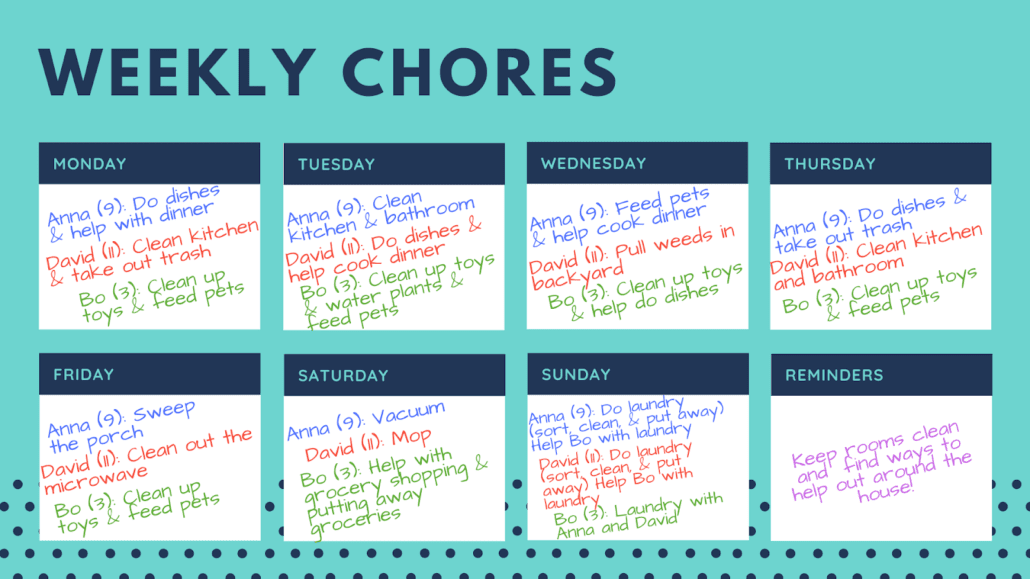
This particular chart is for three children: Anna, who is nine years old, David, who is eleven, and Bo, who is three. Each child is assigned chores that they can do according to their ages. They also take turns doing certain chores, so everyone has a fair amount of chores to do
In the end, the way you design your chore chart will depend on your unique situation.
Enroll Your Children in a School that Encourages Them to Thrive!
As a busy parent, you’re probably not around all the time to watch your children. Therefore, the daycare, preschool, and/or school you enroll your child in should instruct your child in a nurturing way. It should also teach your child important life skills so they can thrive when they are at home and when they aren’t.
Cadence Education values parent communication, exceptional education, fun-filled days, and nurturing environments. The result?
Parents receive meaningful communication about your child’s school days. Through the Kind Child Curriculum, kids learn valuable skills like courtesy, respect, social skills, and other values. The Kindergarten Club helps children excel in problem-solving, mathematics, reading, writing, social studies, and science. Lastly, Cadence Education teachers will care for your child as if s/he was their own. The home-like environment helps children feel happy and comfortable while they are away from home.
In the end, Cadence Education promises to give your child the best experience possible. That way, you can rest assured that your child is happy, healthy, and thriving while you are away.
Find a location near you and schedule a visit today!


